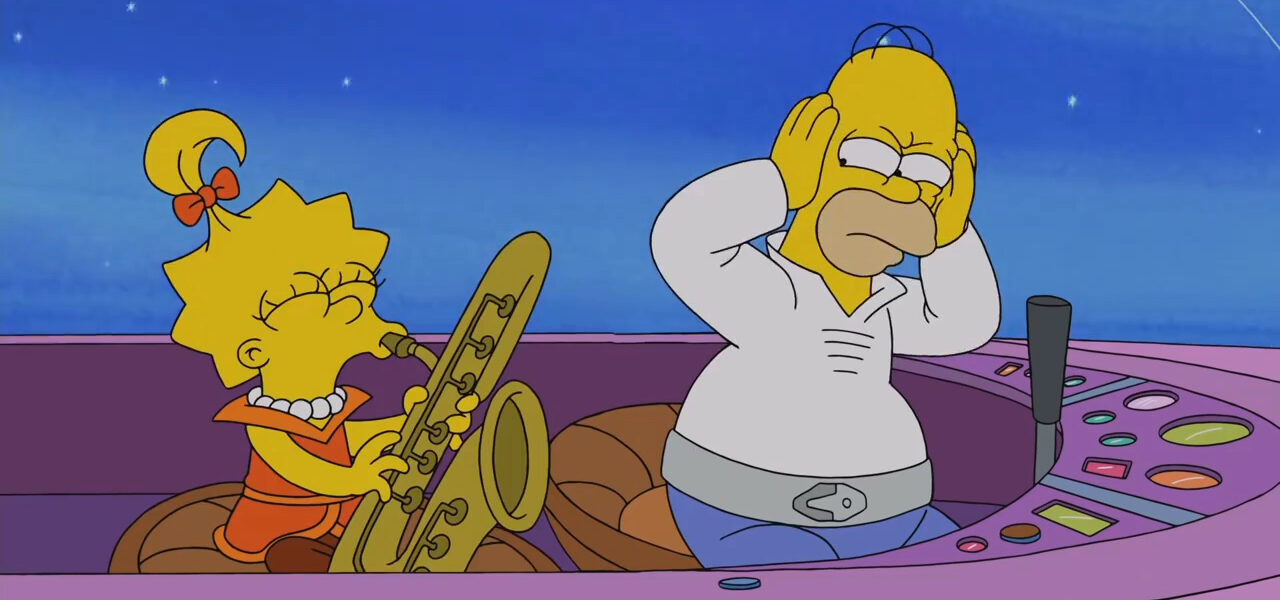Unveiling the Story Behind the Iconic “The Simpsons” Theme Song Introduction “The Simpsons” is a beloved animated series that has captured the hearts of millions around the world. One of the most recognizable aspects of the show is its catchy and unforgettable theme song. In this blog post, we will take you on a musical journey and delve into the creation of “The Simpsons” theme song. Get ready to dive into the fascinating world of composition, collaboration, and the birth of a cultural phenomenon.
1. The Birth of the Theme Song
- A Dynamic Duo: The theme song was composed by Danny Elfman, a renowned composer known for his work in film and television, and the show’s creator, Matt Groening. Together, they aimed to create a theme that would embody the spirit of “The Simpsons” and set the tone for the series.
- An Instant Connection: Elfman was given the opportunity to watch a rough cut of the show’s opening sequence, and he was immediately struck by its energetic and comedic nature. Inspired by Groening’s vision, Elfman set out to create a theme song that would match the show’s irreverent and playful style.
2. The Melodic Masterpiece
- Evolving from Inspiration: Elfman drew inspiration from the classic soundtracks of 1960s spy films and incorporated elements of big band jazz. The result was a lively and infectious melody that captured the essence of the show’s characters and their misadventures in Springfield.
- The Perfect Fit: The theme song’s upbeat tempo, vibrant instrumentation, and memorable melody perfectly complemented the show’s irreverent humor and fast-paced storytelling. Its catchy nature made it instantly recognizable and ensured that it would become an integral part of the show’s identity.
3. Personal Experience: A Timeless Tune
As a fan of “The Simpsons,” I have always been captivated by the show’s theme song. Its lively melody and playful rhythm never fail to bring a smile to my face and evoke feelings of nostalgia. The theme song has become an iconic symbol of the show’s enduring popularity and has transcended generations, captivating viewers young and old alike.
Background on Danny Elfman: A Musical Maestro
Unveiling the Journey and Achievements of Danny Elfman Introduction Danny Elfman is a prolific composer, singer, and songwriter whose remarkable contributions to the world of music have left an indelible mark on the entertainment industry. From his iconic collaborations with acclaimed director Tim Burton to his captivating film scores, Elfman’s creative genius has enchanted audiences worldwide. In this blog post, we will delve into the background of Danny Elfman, exploring his early life, musical career, and the experiences that shaped him into the celebrated artist he is today.
1. The Early Years
- Creative Roots: Born on May 29, 1953, in Los Angeles, California, Daniel Robert Elfman developed a deep passion for music at a young age. He was surrounded by a family with artistic inclinations, which laid the foundation for his artistic journey.
- The Mystic Knights: Elfman’s musical path took a significant turn when he co-founded the band Oingo Boingo in 1972. Known for their eclectic and theatrical performances, the band gained a devoted following and became a prominent fixture in the Los Angeles music scene.
2. Collaboration with Tim Burton
- A Match Made in Cinematic Heaven: Elfman’s collaboration with visionary filmmaker Tim Burton became a defining moment in his career. Their creative partnership began with “Pee-wee’s Big Adventure” in 1985 and continued with iconic films like “Beetlejuice,” “Edward Scissorhands,” and “The Nightmare Before Christmas.”
- Sonic Storytelling: Elfman’s ability to capture the whimsical, dark, and fantastical elements of Burton’s films through his music earned him critical acclaim. His scores not only enhanced the visual storytelling but also became integral parts of the films themselves, adding a layer of emotion and depth to the narratives.
3. Beyond Burton: A Diverse Portfolio
- Beyond the Silver Screen: While Elfman’s collaboration with Tim Burton remains iconic, he has also contributed to numerous other film projects. His versatile compositions can be heard in movies such as “Spider-Man,” “Milk,” “Men in Black,” and “Good Will Hunting,” showcasing his ability to adapt his music to various genres and themes.
- Musical Enchantments: In addition to film scores, Elfman has ventured into other musical endeavors, including composing for television series like “The Simpsons” and “Desperate Housewives,” as well as creating concert works and even a ballet score.
4. Personal Experience: Musical Inspiration
As a lover of film and music, Danny Elfman’s work has always resonated deeply with me. His compositions have the power to transport me to different worlds, evoke a range of emotions, and ignite my imagination. Whether it’s the whimsical melodies of “Edward Scissorhands” or the thrilling beats of “Batman,” Elfman’s music has the ability to capture the essence of a story and enhance the cinematic experience.
Characteristics of “The Simpsons” Theme Song: An Enduring Musical Icon
Exploring the Distinctive Features and Cultural Impact of “The Simpsons” Theme Song Introduction “The Simpsons” theme song is one of the most recognizable and iconic tunes in television history. Composed by Danny Elfman, the theme song has become synonymous with the long-running animated series and has captivated audiences worldwide for decades. In this blog post, we will dive into the characteristics that make “The Simpsons” theme song so unique and explore its lasting cultural impact.
1. Catchy and Memorable Melody
- A Whistle-Inducing Tune: The “The Simpsons” theme song is known for its catchy and instantly recognizable melody. The upbeat tempo, playful rhythm, and infectious hooks make it impossible to resist humming or whistling along.
- Musical Phrases: The theme song’s structure consists of distinct musical phrases that weave together seamlessly, creating a cohesive and memorable composition. Each section of the song contributes to its overall charm and familiarity.
2. Quirky Instrumentation and Orchestration
- The Power of the Orchestra: The theme song’s arrangement utilizes a full orchestra, which gives it a rich and dynamic sound. The combination of strings, brass, woodwinds, and percussion creates a lively and energetic musical backdrop.
- Unconventional Instrumentation: The theme song incorporates unconventional and whimsical instruments like the slide whistle, saxophone, and xylophone, adding a playful and distinctive element to the composition.
3. Memorable Opening Chalkboard and Couch Gags
- Chalkboard Gag: Accompanying the theme song’s opening credits is the iconic chalkboard gag, where Bart Simpson writes humorous and often irreverent messages on the school chalkboard. This recurring visual element has become a beloved part of the show’s introduction.
- Couch Gag: Following the chalkboard gag, each episode features a unique couch gag, showcasing creative and often surreal scenarios in which the Simpson family interacts with their living room couch. These imaginative sequences add an extra layer of entertainment to the viewing experience.
4. Personal Experience: Cultural Impact
As a fan of “The Simpsons” since my childhood, the theme song holds a special place in my heart. Its infectious melody and distinctive instrumentation never fail to evoke a sense of nostalgia and anticipation for the upcoming episode. The theme song has become ingrained in popular culture, representing the enduring legacy of the show and its impact on television history.
Impact and Legacy of “The Simpsons” Theme Song: A Melodic Time Capsule of Popular Culture
Exploring the Enduring Influence and Cultural Significance of “The Simpsons” Theme Song Introduction “The Simpsons” theme song is an iconic piece of music that has left an indelible mark on popular culture. Composed by Danny Elfman, the theme song has accompanied every episode of the long-running animated series, becoming a beloved and recognizable tune worldwide. In this blog post, we will delve into the impact and lasting legacy of “The Simpsons” theme song, examining its influence on television, music, and beyond.
1. Introduction to a Cultural Phenomenon
- A Timeless Tune: The “The Simpsons” theme song instantly sets the stage for each episode, capturing the essence of the show’s satirical humor, vibrant characters, and animated chaos. Its melodic charm serves as a gateway into the world of Springfield and the Simpson family.
- Cultural Zeitgeist: Since its debut in 1989, “The Simpsons” has become more than just a television series; it has become a cultural phenomenon. The theme song’s memorable opening notes evoke a sense of nostalgia and excitement for fans across generations, representing a time capsule of popular culture.
2. Musical Excellence and Craftsmanship
- Danny Elfman’s Signature Style: Composer Danny Elfman’s creation of the theme song is a testament to his musical brilliance. With its lively orchestration, catchy melodies, and whimsical instrumentation, the song exemplifies Elfman’s ability to craft memorable and distinct compositions.
- Infectious Melody: The theme song’s infectious melody has become synonymous with “The Simpsons” brand. Its simple yet unforgettable tune has permeated the collective consciousness, resonating with viewers and inspiring countless covers and adaptations.
3. Popularity Beyond Television
- Soundtrack Success: The popularity of “The Simpsons” theme song extends beyond the show itself. The release of the show’s soundtrack albums, featuring the theme song and other musical highlights, further cemented its status as a beloved cultural artifact.
- Meme-Worthy Material: The theme song’s catchy melody and iconic opening credits have made it a prime target for internet memes and remixes. Its widespread recognition and cultural impact have allowed it to transcend its original purpose and become a canvas for creative reinterpretation.
4. Personal Experience: A Nostalgic Soundtrack
As a longtime fan of “The Simpsons,” the theme song holds a special place in my heart. Hearing its familiar notes instantly transports me back to my childhood, reminding me of the laughter, wit, and clever storytelling that the show has delivered for over three decades. The theme song’s impact on popular culture and its ability to evoke a sense of nostalgia make it a timeless musical masterpiece.
Other Contributions of Danny Elfman to Television and Film: A Maestro’s Journey Through Soundscapes
Exploring the Diverse Works and Creative Genius of Danny Elfman in Television and Film Introduction Danny Elfman, renowned composer and musician, has left an indelible mark on the world of entertainment with his captivating and diverse body of work. While his contributions to “The Simpsons” theme song are widely celebrated, Elfman’s musical genius extends far beyond Springfield. In this blog post, we will explore the other remarkable contributions of Danny Elfman to television and film, delving into his unique soundscapes and the memorable scores that have shaped cinematic experiences.
1. The Magic of Tim Burton Collaborations
- The Nightmare Before Christmas: Elfman’s collaboration with director Tim Burton gave birth to the beloved stop-motion animated film “The Nightmare Before Christmas.” Not only did Elfman compose the enchanting songs and score, but he also provided the singing voice for the film’s main character, Jack Skellington. The hauntingly beautiful soundtrack has become a holiday classic, showcasing Elfman’s versatility and storytelling prowess.
- Edward Scissorhands: Elfman’s evocative score for Tim Burton’s “Edward Scissorhands” perfectly captures the whimsical yet poignant essence of the film. The music serves as a companion to the bittersweet tale of a gentle outcast, showcasing Elfman’s ability to create melodies that tug at the heartstrings.
2. Collaborations with Director Sam Raimi
- Spider-Man Trilogy: Elfman’s collaboration with director Sam Raimi on the Spider-Man trilogy resulted in iconic and heroic musical themes that have become synonymous with the web-slinging superhero. The soaring melodies and powerful orchestrations elevate the action and emotion of the films, leaving a lasting impact on audiences worldwide.
- Dark Shadows: Elfman’s haunting and atmospheric score for Tim Burton’s “Dark Shadows” adds an eerie and gothic layer to the supernatural tale. The music blends melancholy with hints of dark humor, reflecting the unique storytelling style of both Elfman and Burton.
3. Personal Experience: A Soundtrack to Emotions
As an avid moviegoer and music enthusiast, the works of Danny Elfman have played a significant role in my cinematic experiences. From the whimsical melodies of “Edward Scissorhands” to the triumphant superhero themes of Spider-Man, Elfman’s music has accompanied and enriched countless moments on the big screen. His ability to capture the essence of characters, evoke emotions, and transport audiences to different worlds is truly remarkable.
References: A Treasure Trove of Knowledge for Your Research
Unlocking the Power of References for a Well-Rounded and Informed Perspective Introduction References are like the hidden gems of the academic and research world. They serve as valuable sources of information, offering insights, credibility, and depth to your work. In this blog post, we will explore the significance of references, their role in providing a well-rounded perspective, and how they can enhance the credibility and reliability of your research.
1. The Power of Knowledge Expansion
When embarking on a research journey, references act as your guiding light, illuminating the path to deeper understanding. They allow you to delve into the work of experts, scholars, and thought leaders who have dedicated their lives to studying and exploring various topics. By referring to their works, you gain access to a vast ocean of knowledge and broaden your horizons beyond your own perspectives.
2. Building Credibility and Reliability
Including references in your work demonstrates a commitment to accuracy, thoroughness, and evidence-based analysis. By citing reputable sources, you establish a solid foundation for your arguments and add credibility to your research. Readers are more likely to trust and value your work when they see that it is grounded in a wealth of reliable information.
3. Enhancing Critical Thinking and Analysis
References provide a platform for critical thinking and analysis by presenting different viewpoints and perspectives on a subject. They enable you to engage in scholarly conversations, evaluate different arguments, and form your own informed opinions. By examining a variety of sources, you sharpen your analytical skills and develop a more nuanced understanding of the topic at hand.
4. Personal Experience: Navigating the Sea of Knowledge
As a researcher and writer, I have personally experienced the transformative power of references in my work. They have guided me through the intricacies of complex topics, challenged my assumptions, and enriched my understanding of various subjects. References have not only provided me with valuable insights but have also given me the confidence to present well-informed and evidence-based arguments.
FAQ: Wrote the Simpsons Theme
Who is the composer behind “The Simpsons” theme music?
The composer of “The Simpsons” theme music is Danny Elfman.
What role did Green Day play in relation to “The Simpsons” theme?
Green Day performed the theme tune for a special “The Simpsons” episode.
Can you describe the process of creating the iconic “The Simpsons” theme?
Danny Elfman mentioned that composing “The Simpsons” theme was one of the easiest things he’s ever done, and he completed it in a matter of minutes.
How did Danny Elfman respond when he was approached to compose the theme music?
Danny Elfman said, “If you want something retro and sort of inspired by ‘Hanna-Barbera,’ I think I’m the right guy for it.”
What is the significance of the saxophone solo in “The Simpsons” theme?
The saxophone solo is a prominent feature in “The Simpsons” theme music, giving it a unique and recognizable sound.
How did Danny Elfman come up with the theme music’s melody?
Danny Elfman mentioned that he literally wrote the main title theme music in the car on his way home from the meeting with the show’s creators.
What is the story behind the creation of the theme music for “The Simpsons” Halloween episodes?
The theme music for “The Simpsons” Halloween episodes, known as the “Treehouse of Horror” episodes, was recorded in a slightly different and more orchestral style.
How did Danny Elfman’s background in new wave music influence the theme composition?
Danny Elfman’s background in new wave music contributed to the energetic and playful style of the theme music.
Did Danny Elfman anticipate the long-lasting success of “The Simpsons” theme?
Danny Elfman mentioned that he didn’t think much about the theme’s future and that he composed it purely for fun.
What awards and recognition did “The Simpsons” theme music receive?
“The Simpsons” theme music earned Danny Elfman an Emmy Award and a National Music Award, reflecting its popularity and impact on television culture.
Who composed the iconic “The Simpsons” TV theme?
The composer of the famous “The Simpsons” TV theme is Danny Elfman.
What show does the theme belong to?
The theme music is associated with the animated TV show “The Simpsons.”
How did Danny Elfman describe the process of composing the theme?
Danny Elfman mentioned that creating the “The Simpsons” theme was “the easiest thing” he has ever done.
How did Danny Elfman respond when asked to create the theme?
He responded with a humorous, “If you want something, here’s what I’ve got.”
What is the ironic element associated with the theme?
The theme’s upbeat and cheerful melody contrasts with the satirical and often subversive nature of the show, creating an ironic effect.
What word did Danny Elfman use to describe his reaction to the theme’s success?
He referred to the theme’s popularity as “amazing.”
How is the theme referred to in the statement, “‘The’ favorite TV theme”?
The word “The” suggests that the theme is considered one of the most popular and beloved TV themes.
Which characters from “The Simpsons” are mentioned in the context of the theme?
The characters “Lisa” and “Homer” are associated with the show and its theme.
At which music festival did “The Simpsons” theme make an appearance?
The theme was performed at the Coachella music festival by Danny Elfman’s band, Oingo Boingo.
What did Danny Elfman do after composing the theme?
He recorded a demo for the theme, which he played in his car on the way home from the studio.












